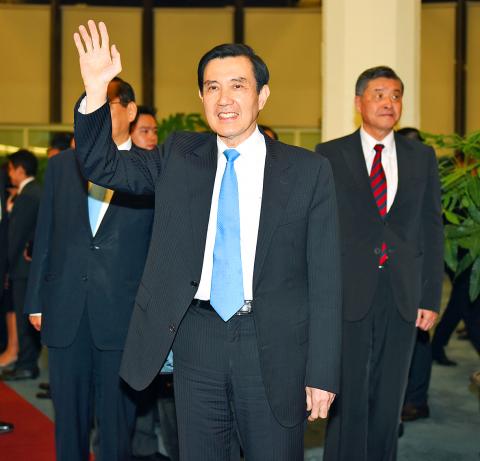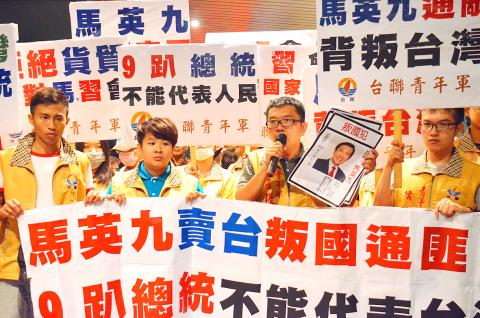In response to criticism over his meeting in Singapore with Chinese President Xi Jinping (習近平), President Ma Ying-jeou (馬英九) defended his performance while on board a flight back to Taiwan, which arrived at Taiwan Taoyuan International Airport early yesterday morning.
During the flight, Ma told reporters that the most significant result of his meeting with Xi was that leaders from the two sides of the Taiwan Strait had finally met and expressed their willingness to jointly discuss relevant issues.
“There are too many problems across the Strait that need to be dealt with. While a number of them have been resolved over the past few years, there are still many left, which is why we require a communication platform at a higher level,” Ma said, adding that the meeting was just a first step.

Photo: CNA
Asked how he felt about Xi’s response to Taiwanese concern over the threat China’s military poses to Taiwan, Ma said he was “not very satisfied” with Xi’s answer that the deployments did not target Taiwan.
“I told Xi that Taiwanese are rather concerned about the issue and hope China could make some gestures of goodwill... While I am not content with Xi’s response, at least I started the dialogue and I will bring up the matter again if given the opportunity in the future,” Ma said.
Ma added that he said everything he “was supposed to say” in front of Xi, including two mentions of the Republic of China (ROC) Constitution, as well as one mention each of the ROC and “one China, different interpretations.”

Photo: Chiu I-tung, Liberty Times
However, Xi did not make any significant reactions to his references to the ROC, Ma said, adding that he did not say “ROC president” during their meeting.
Shrugging off Democratic Progressive Party (DPP) presidential candidate Tsai Ing-wen’s (蔡英文) criticism of the meeting’s outcome, Ma said he had clearly mentioned “one China, different interpretations” and the so-called “1992 consensus” — a term former Mainland Affairs Council chairman Su Chi (蘇起) admitted making up in 2000 that refers to a tacit understanding between the Chinese Nationalist Party (KMT) and the Chinese government that both sides acknowledge there is “one China,” with each side having its own interpretation of what “China” means.
“‘One China, different interpretations’ means we can have different interpretations of the term ‘one China,’ while the ‘1992 consensus’ allows both sides to verbally state their respective interpretations of what ‘one China’ means,” Ma said.
“This is what gives us room [to maneuver]. Without this space, why would it be called the ‘1992 consensus?’” he added.
In regards to his performance at the meeting, Ma said he fulfilled nearly all of his original objectives, including bringing up the “1992 consensus”; “one China, different interpretations”; and the Constitution’s prohibition on remarks such as “two Chinas,” “one China, one Taiwan” and Taiwanese independence.
“Some have misunderstood my words as an attempt to fawn to the People’s Republic of China, but it was not. These terms are forbidden by our own Constitution,” Ma said.
Meanwhile, Premier Mao Chi-kuo (毛治國) said the Ma-Xi meeting had major historic significance, as both leaders took an important first step toward more institutionalized meetings in the future. Mao made the remarks yesterday afternoon while visiting the Taipei International Travel Fair, at which he met with travel industry representatives.
“This historic event has drawn global attention, and we, the people in Taiwan, should be united to tell the world about the importance of having peaceful cross-strait relations,” Mao said. “This is also an opportunity to let the world know about the contributions made by Taiwanese to peaceful development in the Asia-Pacific region.”
When asked if Chinese tourists would be allowed to make transit stops in Taiwan while he remains in office, Mao said that is “one of the follow-up issues that we will have to work on.”

The CIA has a message for Chinese government officials worried about their place in Chinese President Xi Jinping’s (習近平) government: Come work with us. The agency released two Mandarin-language videos on social media on Thursday inviting disgruntled officials to contact the CIA. The recruitment videos posted on YouTube and X racked up more than 5 million views combined in their first day. The outreach comes as CIA Director John Ratcliffe has vowed to boost the agency’s use of intelligence from human sources and its focus on China, which has recently targeted US officials with its own espionage operations. The videos are “aimed at

STEADFAST FRIEND: The bills encourage increased Taiwan-US engagement and address China’s distortion of UN Resolution 2758 to isolate Taiwan internationally The Presidential Office yesterday thanked the US House of Representatives for unanimously passing two Taiwan-related bills highlighting its solid support for Taiwan’s democracy and global participation, and for deepening bilateral relations. One of the bills, the Taiwan Assurance Implementation Act, requires the US Department of State to periodically review its guidelines for engagement with Taiwan, and report to the US Congress on the guidelines and plans to lift self-imposed limitations on US-Taiwan engagement. The other bill is the Taiwan International Solidarity Act, which clarifies that UN Resolution 2758 does not address the issue of the representation of Taiwan or its people in

US Indo-Pacific Commander Admiral Samuel Paparo on Friday expressed concern over the rate at which China is diversifying its military exercises, the Financial Times (FT) reported on Saturday. “The rates of change on the depth and breadth of their exercises is the one non-linear effect that I’ve seen in the last year that wakes me up at night or keeps me up at night,” Paparo was quoted by FT as saying while attending the annual Sedona Forum at the McCain Institute in Arizona. Paparo also expressed concern over the speed with which China was expanding its military. While the US

SHIFT: Taiwan’s better-than-expected first-quarter GDP and signs of weakness in the US have driven global capital back to emerging markets, the central bank head said The central bank yesterday blamed market speculation for the steep rise in the local currency, and urged exporters and financial institutions to stay calm and stop panic sell-offs to avoid hurting their own profitability. The nation’s top monetary policymaker said that it would step in, if necessary, to maintain order and stability in the foreign exchange market. The remarks came as the NT dollar yesterday closed up NT$0.919 to NT$30.145 against the US dollar in Taipei trading, after rising as high as NT$29.59 in intraday trading. The local currency has surged 5.85 percent against the greenback over the past two sessions, central